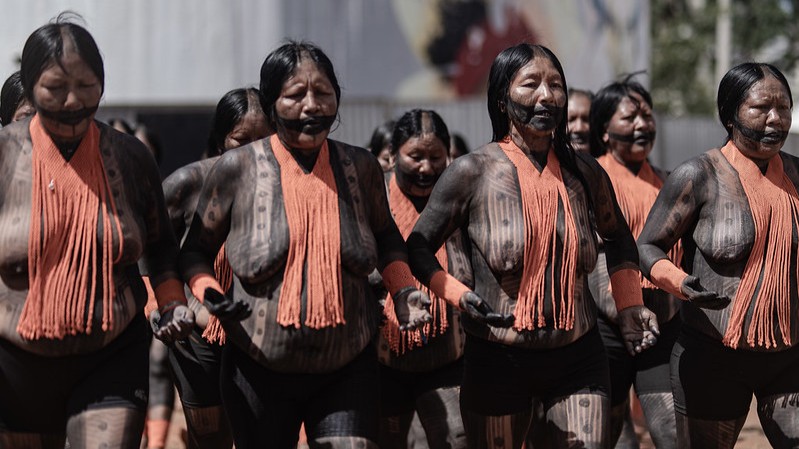Indigenous peoples and COP30: Guardians of the Earth, Voices for the Future
Letter from Sonia Guajajara, Minister of Indigenous Peoples of Brasil

This month we celebrate two dates of profound symbolism: the Amazônia Day in Brasil and the International Indigenous Women's Day. This coincidence is not just a mark on the calendar — it is a reminder that the future of the planet is intrinsically linked to the voices and rights of Indigenous peoples. I write from the collective experience of the People's Circle of the Presidency of COP30, and, in particular, the International Indigenous Commission.
There are approximately 476 million Indigenous people in the world. Although they represent only 6% of the global population, they are responsible for protecting and managing hundreds of millions of hectares of land, safeguarding much of the biodiversity that remains. Almost 40% of the planet's intact forests are located in Indigenous territories, where deforestation rates are consistently lower than in areas protected by the state itself. The evidence is clear: where Indigenous territorial rights are respected, deforestation declines; where they are denied, destruction advances.
Indigenous peoples are not just environmental defenders. They are guardians of ancient cultures, bearers of knowledge, ways of life and values that ensure the continuity of forests, rivers and biodiversity. As Ambassador André Corrêa do Lago wrote in his first letter, humanity needs to regenerate its relationship with nature. To do so, it is essential to combine the best of science and technology with ancestral wisdom, ushering in a new paradigm of reconnection between humans and nature.
Expanding qualified participation and listening
In Brasil, the creation of the first Ministry of Indigenous Peoples represented a milestone. For the first time, they have occupied important spaces, directly influencing decision-making processes. This experience has already translated into advances in the development and implementation of public policies and, consequently, into more direct collaboration in the protection of forests and territories essential for climate maintenance. Thus, holding COP30 in Brasil and the Amazônia is a way to multiply this experience.
But challenges remain. Although the Climate Convention recognised the importance of traditional knowledge in 2015 with the creation of the Indigenous Peoples and Local Communities Platform, Indigenous participation is still limited.
To achieve the most diverse and pluralistic COP ever, focused on effective solutions for meeting the global goals we have committed to, it is necessary to strengthen indigenous participation through their own credentials and in greater numbers.
In addition to the credentials of organisations, which are generally limited, we invite other countries to adopt a practice that Brasil has been implementing for several years: incorporating Indigenous leaders into their national delegations.
We are already committed to welcoming all these leaders by creating an important accommodation space: the COP Village. Ensuring that COP30 in Brasil goes down in history as the conference with the highest Indigenous participation is another important step in our defense of multilateralism.
Indigenizing the Rulebook in times of climate emergency
The so-called ‘Rulebook’ of the Paris Agreement is now concluded, but it can and should be enriched. Indigenous contributions — especially in defining global adaptation indicators — are fundamental.
Protecting Indigenous territories is not only a matter of historical justice, but also of the planet's survival. Large biomes such as the Amazônia are on the verge of reaching the point of no return and are at risk of releasing enormous amounts of stored carbon. Protecting Indigenous territories is one of the most effective mitigation strategies available.
It is also urgent to ensure that climate transition is fair. The Just Transition Work Programme, launched in Dubai, must ensure that measures to reduce emissions do not repeat the mistakes of the past, when so-called ‘progress’ was made at the expense of vulnerable communities. Indigenous peoples must not only be heard; they must be guaranteed the right to free, prior and informed consent on all measures affecting their territories and cultures.
An urgent Action Agenda
Brasil has pointed out on several occasions that this COP needs to focus on the full implementation of the Paris Agreement. To this end, we are developing an Action Agenda linked to the Global Stocktake. And, of course, Indigenous peoples are also a fundamental part of the immediate solutions in this agenda.
Financing remains one of the most complex issues in climate negotiations. Despite being directly responsible for conserving almost half of the biodiversity still protected, as well as a large share of the terrestrial carbon stocks and sinks, Indigenous peoples receive only a minimal fraction of the resources allocated to climate action and biodiversity protection. Increasing this percentage means investing in effective solutions: supporting those who, with limited means, are already achieving concrete results for climate balance.
COP30 will be historic not only because it is taking place in the Amazônia, but because it could usher in a new form of climate governance: pluralistic, community-based, fair and guided by those who have always known how to care for the Earth. To curb global warming and meet the goals of the Paris Agreement, we need ambition, concrete action, and also a ‘re-enchantment,’ what we Indigenous women in Brasil call reforesting the minds—the ability to see life in its fullness and harmony, beyond metrics and reports.
Belém will be the place where science and ancestral knowledge can walk side by side. May COP30 be remembered as the moment when humanity recognised that Indigenous peoples are not just part of the solution: they are protagonists of the future that we need to build collectively.
Sonia Guajajara
Circle of People, COP30
Ministry of Indigenous Peoples, Brasil
Lettre de Sonia Guajajara, ministre des Peuples autochtones du Brésil
